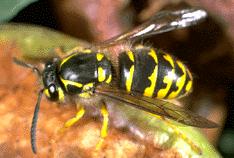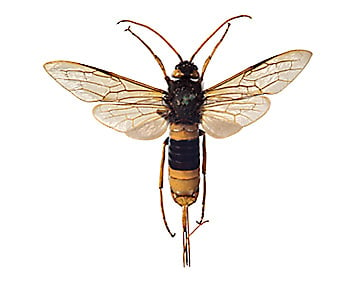Wasps
Wasps are classed as pests and their presence may cause a nuisance. The Isle of Wight Council enforces the Prevention of Damage by Pests Act 1949 and does not provide a pest control service. The landowner may have to pay for the treatment.
If in doubt telephone your local Environmental Health Department.
Tel: 01983 823000.
Identification:
Wasps are members of the order Hymenoptera (skin wings) and come in many types and sizes. Their social organizations range from cooperative fertile females paper wasps to the caste system of yellow jackets, in which there is a single fertile queen and a large population of smaller unmated females. Due to their size and colouration these wasps are often mistaken for bees. Bees are not nearly as aggressive and are valued as major pollinators as well as honey producers.
Wasps, yellowjackets and hornets have a lance-like stinger without barbs and can sting repeatedly. They should be brushed off the victim's skin promptly with deliberate movements, then quietly and immediately leave the area.

Compare with :-
Sawfly – Wood Wasp often mistaken for a wasp.
HARMLESS – It does not have a sting !!

Scientific name: Uroceras gigas. Parasite of Larch trees.
Body length: 30mm.
Flight period: May - August.
The large size and black and yellow colouration mean that this 'wasp' causes more than a few scares, but it is not a wasp at all, it is a sawfly and completely harmless. The large 'sting' is in fact the ovipositor, which is used to lay eggs (and gives it the alternative name of horntail). Most often seen in coniferous woodland.
Common in Staffordshire and Isle of Wight.
PLEASE REMEMBER.
Wasp Stings:
Some people develop acute allergic reactions to wasp stings. An allergic reaction becomes evident in less than an hour and consists of extreme difficulty in breathing, heart irregularity, shock, splotched skin, and speech difficulty.
A person showing signs of an allergic reaction
should see a medical doctor immediately.
For more information regarding this Leaflet please contact:
Environmental Health Service
Jubilee Stores
The Quay
Newport
Isle of Wight
PO30 2EH
Telephone: 01983 823000
Facsimile: 01983 529804
©Isle of Wight Council, May 2004
Page last updated on: 30/08/2007





